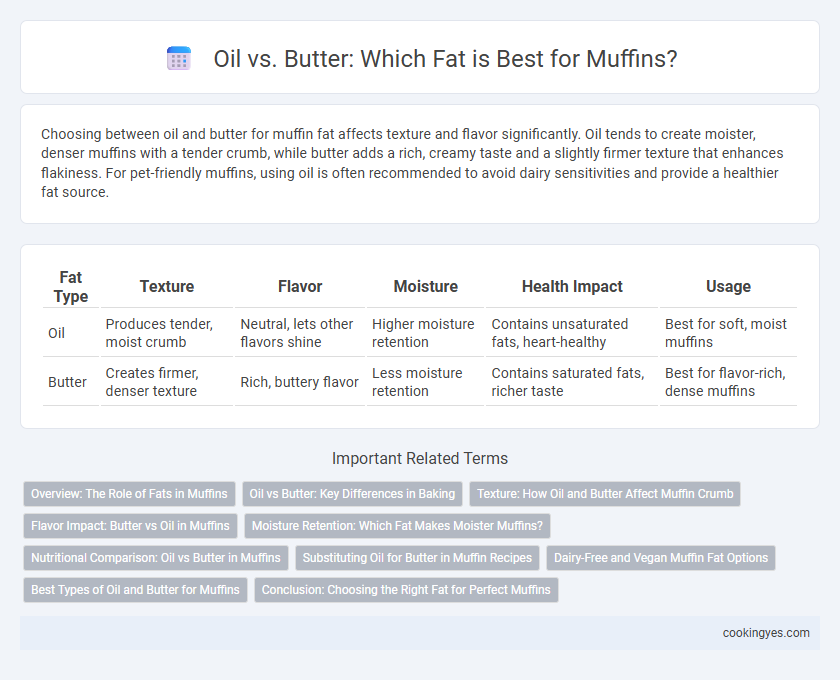Choosing between oil and butter for muffin fat affects texture and flavor significantly. Oil tends to create moister, denser muffins with a tender crumb, while butter adds a rich, creamy taste and a slightly firmer texture that enhances flakiness. For pet-friendly muffins, using oil is often recommended to avoid dairy sensitivities and provide a healthier fat source.
Table of Comparison
| Fat Type | Texture | Flavor | Moisture | Health Impact | Usage |
|---|---|---|---|---|---|
| Oil | Produces tender, moist crumb | Neutral, lets other flavors shine | Higher moisture retention | Contains unsaturated fats, heart-healthy | Best for soft, moist muffins |
| Butter | Creates firmer, denser texture | Rich, buttery flavor | Less moisture retention | Contains saturated fats, richer taste | Best for flavor-rich, dense muffins |
Overview: The Role of Fats in Muffins
Fats like oil and butter play a crucial role in muffin texture, moisture, and flavor. Oil typically produces a moist, tender crumb due to its liquid state at room temperature, while butter provides a richer taste and a slightly denser texture because of its solid fat content. The choice between oil and butter directly affects muffin softness, shelf life, and overall sensory experience.
Oil vs Butter: Key Differences in Baking
Oil creates muffins with a moist, tender crumb due to its liquid form at room temperature, while butter adds a rich flavor and contributes to a slightly firmer texture because it solidifies when cooled. Butter contains water and milk solids, which can cause muffins to rise more evenly and develop a golden crust, whereas oil's pure fat composition results in a denser bake. Choosing between oil and butter depends on the desired texture and flavor profile in muffin recipes.
Texture: How Oil and Butter Affect Muffin Crumb
Oil creates a moist and tender muffin crumb due to its liquid state at room temperature, allowing for a softer texture that retains moisture longer. Butter contributes to a richer flavor and a denser, flakier crumb because it solidifies when cooled, providing structure and slight crispness to the muffin's edges. Choosing between oil and butter significantly impacts the muffin's overall mouthfeel and crumb texture, with oil promoting softness and butter enhancing firmness and flavor complexity.
Flavor Impact: Butter vs Oil in Muffins
Butter imparts a rich, creamy flavor and tender crumb to muffins, enhancing their overall taste with a distinct buttery aroma. Oil produces a moister texture but has a neutral flavor, allowing other ingredients like fruits or spices to stand out more prominently. Choosing between butter and oil affects not only the flavor profile but also the mouthfeel and shelf-life of muffins.
Moisture Retention: Which Fat Makes Moister Muffins?
Butter enhances flavor and contributes to a tender crumb in muffins, but oil excels in moisture retention due to its liquid state at room temperature, resulting in consistently moister muffins. Oils like canola, vegetable, or sunflower oil coat flour proteins more effectively, reducing gluten formation and preserving moisture during baking. Choosing oil over butter can significantly improve the soft, moist texture preferred in muffin recipes.
Nutritional Comparison: Oil vs Butter in Muffins
Oil in muffins typically contains unsaturated fats, which may support heart health by reducing LDL cholesterol levels, while butter provides saturated fats that can raise LDL cholesterol but also deliver fat-soluble vitamins like A, D, and E. Oils such as canola, olive, or vegetable oil offer a higher concentration of healthy fats and fewer calories per gram compared to butter, which contains approximately 102 calories per tablespoon and 7 grams of saturated fat. Choosing oil over butter in muffin recipes can improve the nutritional profile by lowering saturated fat intake and increasing essential fatty acids, contributing to a healthier lipid balance.
Substituting Oil for Butter in Muffin Recipes
Substituting oil for butter in muffin recipes creates a moister texture due to oil's liquid state at room temperature, enhancing tenderness and shelf life. Oil varieties like vegetable or canola provide neutral flavors, allowing the muffin's primary ingredients to shine, whereas butter imparts a richer, more distinct flavor profile. For accurate substitution, use about 20% less oil than butter by volume to maintain optimal consistency and structural integrity of the muffins.
Dairy-Free and Vegan Muffin Fat Options
Oil offers a moist texture and is ideal for dairy-free and vegan muffins, as it eliminates the need for animal-based ingredients like butter. Common plant-based oils such as coconut, canola, and vegetable oil provide healthy fats and enhance the muffin's softness without compromising flavor. These oil alternatives support a fully vegan diet while maintaining the rich consistency typical of traditional muffins.
Best Types of Oil and Butter for Muffins
Using oils like vegetable, canola, or light olive oil in muffins results in moist, tender crumb and enhances flavor without overpowering other ingredients. Butter, especially unsalted or European-style, provides rich taste and a slightly denser texture due to its milk solids and water content. Choosing the right fat depends on desired texture and flavor, with oil promoting softness and butter delivering a classic, buttery richness.
Conclusion: Choosing the Right Fat for Perfect Muffins
Choosing the right fat for muffins depends on the desired texture and flavor; butter provides a rich, creamy taste and tender crumb, while oil results in a moist, denser muffin with a lighter crumb. Butter enhances flavor due to its milk solids, but oil offers a longer shelf life and better moisture retention. For fluffy, flavorful muffins, butter is ideal, whereas oil suits recipes where moistness and softness are prioritized.
Oil vs butter for muffin fat Infographic

 cookingyes.com
cookingyes.com